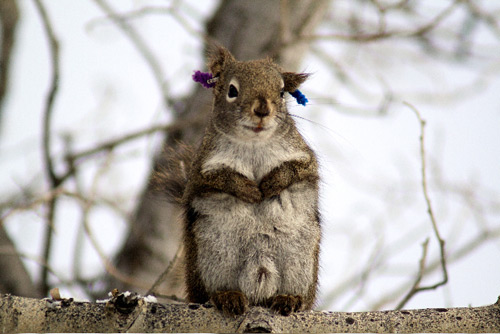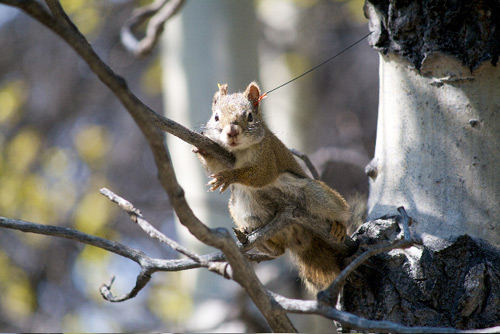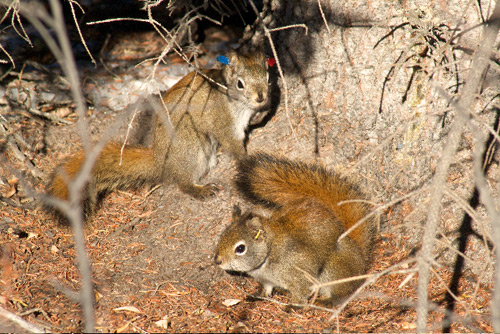Opportunity Leads to Promiscuity Among Squirrels, Study Finds
December 15, 2010 - News Release
University of Guelph researchers have finally figured out why female squirrels are so darn promiscuous. Turns out it has nothing to do with genes and everything to do with how many males are knocking at their door.
"Their behaviour is overwhelmingly influenced by opportunity,” said graduate student Eryn McFarlane, who, along with integrative biology professor Andrew McAdam and a team of researchers from across Canada, solved a mystery that has baffled biologists for years.

Photo Credit: Ryan W. Taylor
Their findings appear in the Royal Society Journal Biology Letters.
Female squirrels are less than picky when it comes to mating, often entertaining as many suitors as possible. Such risky female behaviour is puzzling in the mammal world.
Although it makes sense for male squirrels to have as many mates as possible to ensure the most offspring, promiscuity doesn’t always make sense for females, said McFarlane.
“Having multiple partners means more energy expended on mating, increased exposure to predators as well as increased potential for the spread of sexually transmitted diseases,” she said. “Promiscuity also encourages harassment from male squirrels trying to coerce them into having sex.”

Photo Credit: Ryan W. Taylor
Trying to solve this puzzle has prompted a lot of research into the possible benefits of mating with many males, said McAdam. But optimal mating strategies can evolve only if there is a genetic basis to the behaviour.
The Guelph team discovered that female squirrel behaviour results from opportunity alone and not from genetics, limiting its ability to evolve.
“We found the more males in the area interested in participating in the mating chase, the more squirrels she will mate with,” McFarlane said. “There are no strong ties between mating behaviour and genetics in red squirrels. So even if the costs of mating with many males outweighs the benefits, there doesn’t seem to be much capacity for them to evolve lower levels of promiscuity.”
The researchers analyzed data collected from 108 mating chases involving 85 female squirrels. Researchers Jeff Lane and Ryan Taylor collected the data as part of the Kluane Red Squirrel Project, a long-term field experiment in Yukon investigating the importance of food abundance to the ecology and evolution of red squirrels. Established in 1987, the project has seen scientists from several collaborating universities, including the University of Guelph, monitoring behaviour and reproduction of about 7,000 squirrels.
After analyzing the data, McFarlane and McAdam found that female squirrels mated with anywhere from one to 14 partners and that female promiscuity was not reliably inherited by offspring.
“A female squirrel that only chose to mate with one male could have a daughter that mates with many males,” McAdam said. “It seems the tendency to mate with fewer males isn’t something that is being passed down to offspring.”
A female red squirrel usually goes into heat for only a single day each year, typically releasing three or four eggs to be fertilized. During the preceding few days, she leaves scent nearby to let males know she’s getting ready. On the day itself, she runs around to encourage interested males to give chase.
Whether several males, or perhaps only one or two, wait by the nest, females often mate with as many as are available.
“The reality is that organisms cannot always be well adapted to their environment,” said McAdam. “Sometimes organisms do things that detract from their survival because they aren’t able to evolve a better alternative.”

Photo Credit: Ryan W. Taylor
More information and photos of the research study.
For media questions, contact Communications and Public Affairs: Lori Bona Hunt, 519-824-4120, Ext. 53338, or lhunt@uoguelph.ca, or Deirdre Healey, Ext. 56982 or dhealey@uoguelph.ca.
Contacts:
Eryn McFarlane, graduate student/lead researcher
519-835-3039
mcfarlas@uoguelph.ca
Prof. Andrew McAdam
Department of Integrative Biology
519-824-4120, Ext.56826
amcadam@uoguelph.ca